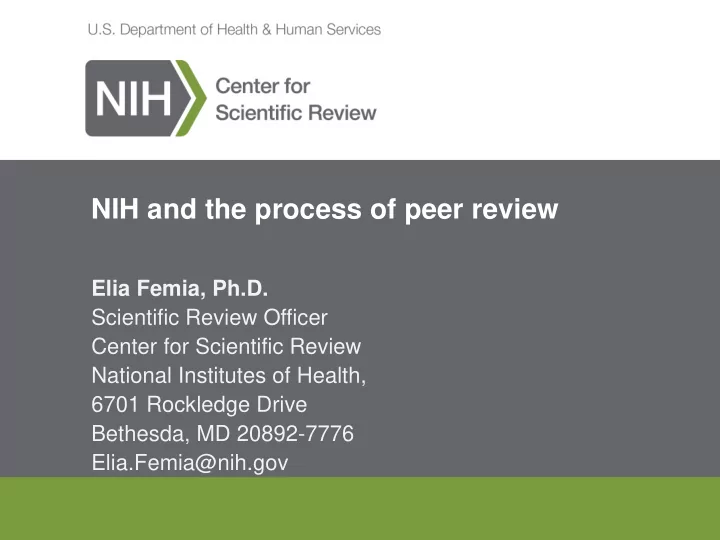

NIH and the process of peer review Elia Femia, Ph.D. Scientific Review Officer Center for Scientific Review National Institutes of Health, 6701 Rockledge Drive Bethesda, MD 20892-7776 Elia.Femia@nih.gov
What is the How does the What is the NIH and its NIH support process of mission? its mission? peer review?
What is the How does the What is the NIH and its NIH support process of mission? its mission? peer review?
National Institutes of Health The NIH is the largest public funder of biomedical research in the world, with an annual budget of over $37 billion dollars.
NIH . . . Turning Discovery Into Health Mission: to seek fundamental knowledge about the nature and behavior of living systems and the application of that knowledge to enhance health, lengthen life, and reduce illness and disability.
NIH Institutes and Centers Office of the Director National Institute Eunice Kennedy National Institute National Institute National Institute of Arthritis and National Cancer Shriver National Institute on Alcohol Abuse of Allergy and on Aging Musculoskeletal Institute of Child Health and and Alcoholism Infectious Diseases and Skin Diseases Human Development National Institute on National Institute National Institute National Institute Deafness and Other of Dental and of Diabetes and National Institute National Eye of Environmental Communication Craniofacial Digestive and on Drug Abuse Institute Health Sciences Disorders Research Kidney Diseases National Institute National Institute National Heart, National Human National Institute of Neurological National Institute of General Lung, and Blood Genome Research of Mental Health Disorders and of Nursing Research Medical Sciences Institute Institute Stroke National Institute of National Center for National Institute on John E. Fogarty National Center National Library Biomedical Imaging Complementary and Minority Health and International for Advancing of Medicine and Bioengineering Integrative Health Health Disparities Center Translational Sciences Center for Center for Clinical Center Information Scientific Review Technology
What is the How does the What is the NIH and its NIH support process of mission? its mission? peer review?
From Idea to NIH Grant Award Identify an IC that aligns with your work/idea. Look for a funding opportunity (FOA), which ensures that the IC is potentially interested in your area of science grants.nih.gov Identify the type of project you want to do research project, small business innovation, training/career development, research center and contact the IC/Program Officer. Write and submit your application grants.gov Watch Video!! NIH Grants Process: The Big Picture https://www.youtube.com/watch?v=rNwsg_PR90w
From Idea to NIH Grant Award The Division of Receipt and Referral assigns the application to a study section. A Scientific Review Officer (SRO) oversees the review process. Reviewers with scientific and technical expertise in your area of science evaluate the application’s scientific merit and overall impact.
From Idea to NIH Grant Award
From Idea to NIH Grant Award
What is the How does the What is the NIH and its NIH support process of mission? its mission? peer review?
NIH Peer Review System for Grant Applications
CSR Mission To see that NIH grant applications receive fair, independent, expert, and timely reviews – free from inappropriate influences – so NIH can fund the most promising research.
CSR Peer Review Snapshot (FY: 2017) • 95,000 applications received • 18,000 reviewers • 61,000 reviewed at CSR!!! • 1,600 review meetings Approximately 240 chartered study sections and recurring Special Emphasis Panels reviewed: o Research Grant Applications (R01, R21, R34, R15, etc.) o Fellowship Applications (F awards) o Academic Research Enhancement Award Applications o Small Business Innovation Research Applications (R43/R44)
Overall Timeframe from Submission to Award http://grants1.nih.gov/grants/funding/submissionschedule.htm
Applications Are Assigned to: Institutes or Centers (IC) based on… Overall mission and guidelines of the Institute or Center; Specific programmatic mandates and interests of the Institute or Center. Integrated Review Groups (IRG) based on… Specific review guidelines for each IRG. Standing Study Sections (SRG) based on… Match of subject matter to the referral guidelines for the SRG. OR Special Emphasis Panels (SEPs) based on… When the subject matter does not fit into any SRG; When assignment of an application to the most appropriate study section creates a conflict of interest; When certain types of grants are sought (e.g., fellowships, SBIRs).
The Review Panel
Review Criteria 5 Core Review Criteria Overall Impact Each scored from 1-9 Scored from 1-9 – Significance Assessment of the likelihood for the project to exert a sustained, – Investigator(s) powerful influence on the – Innovation research field(s) involved – Approach – Environment Scientific Rigor Scientific Premise
9-Point Scoring Scale
At the meeting
At the Meeting – what is discussed? • Significance and Overall Impact • Scientific premise and rigor • Innovation - exciting ideas • Realistic aims and timelines • Application’s consideration of the limitations of the study • Protection of Human Subjects and/or Vertebrate animals • Inclusion of women, minorities, and children • Sex as a biological variable • Biohazards
Applications that are Not Discussed • Not discussed applications will only have criterion scores and the reviewers’ critiques.
After review
Summary Statement
TIPS and STRATEGIES when applying for an NIH Grant
When Preparing an Application • Read instructions; • Never assume that reviewers will know what you mean; • Refer to pertinent literature; • Don’t overstate the significance of your research; • State rationale of proposed investigation; • Include well-designed tables and figures; • Present an organized, lucid write-up; • Don’t be overly ambitious; • Obtain pre-review from colleagues at your organization. Insider’s Guide to Peer Review for Applicants: http://www.csr.nih.gov/applicantresources/insider
Common Problems in Applications • Lack of new or original ideas; • Absence of an acceptable scientific rationale; • Lack of experience in the essential methodology; • Questionable reasoning in experimental approach; • Uncritical approach; • Diffuse, superficial, or unfocused research plan; • Lack of sufficient experimental detail; • Lack of knowledge of published relevant work; • Unrealistically large amount of work; • Uncertainty concerning future directions.
Key NIH Review and Grants Web Sites NIH Center for Scientific Review http://www.csr.nih.gov NIH Office of Extramural Research http://grants.nih.gov/
Recommend
More recommend